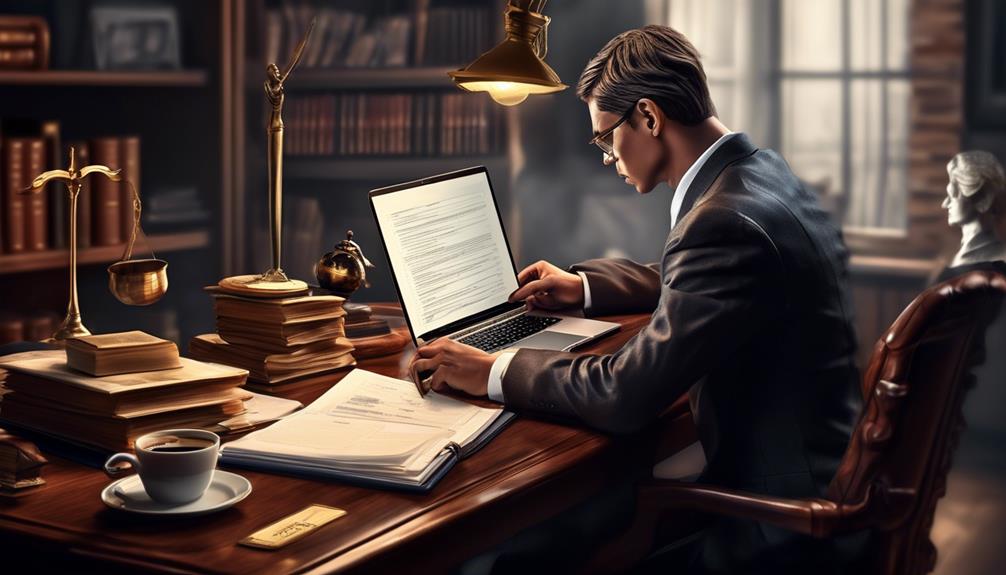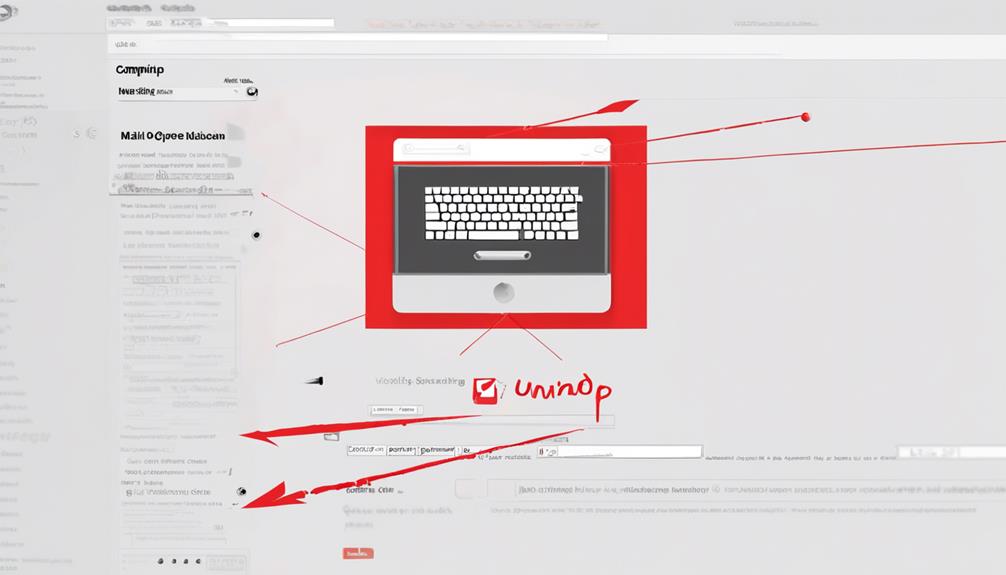When creating messages for legal professionals, mastering the skill of effective communication is key. It involves treating the recipient with respect and clearly stating your requirements in a succinct manner, each detail significantly influences the impact of your correspondence.
As we navigate the intricacies of composing an email to a lawyer, we will shed light on key strategies that can elevate the impact of your communication and potentially influence the trajectory of your legal matters.
Key Takeaways
- Clear and organized email structure is crucial for effective communication.
- Use a formal salutation and maintain a professional and courteous tone throughout the email.
- Clearly state the reason for communication and provide relevant information concisely.
- Close the email politely, expressing gratitude and leaving a lasting impression.
Email Structure and Format
When composing an email to a lawyer, ensuring a clear and organized structure is crucial for effective communication. An email should begin with a concise and descriptive subject line that summarizes the purpose of the message. This helps the recipient understand the content at a glance.
Following this, it's important to address the lawyer politely but firmly in the salutation. Using their appropriate title and last name is recommended.
In the body of the email, it's essential to provide a brief introduction that states the reason for reaching out. This sets the tone for the rest of the email. Using email templates can be helpful in maintaining a professional format and ensuring all necessary information is included.
When discussing the main points, be clear and specific, providing any relevant details or context.
Addressing the Lawyer Professionally

In addressing the lawyer professionally, it's paramount to use a formal salutation, such as 'Dear Mr./Ms. [Last Name],' to establish a respectful tone from the outset.
When composing an email to a lawyer, there are several key points to consider:
- Formal Salutation: Begin your email with a respectful greeting, using the appropriate title and last name of the lawyer you're addressing.
- Clear Purpose: Clearly state the reason for your email in the subject line and opening paragraph to ensure the lawyer understands the nature of your communication.
- Professional Tone: Maintain a professional and courteous tone throughout the email, using formal language and avoiding slang or abbreviations.
When addressing a lawyer in written correspondence, especially concerning legal documents or matters, adhering to these guidelines is essential for creating a positive and professional impression. By following these practices, you can effectively communicate with lawyers and convey your message clearly and respectfully.
—
The response focuses on the importance of addressing lawyers professionally in emails, highlighting the necessity of formal salutations, clear communication of purpose, and a professional tone throughout the correspondence. The information is concise and structured for clarity.
Clearly Stating Your Purpose
How can we effectively convey our purpose when reaching out to a lawyer via email? When contacting a lawyer through email, it is crucial to clearly state the reason for your communication right from the start. This sets the tone for the rest of the email and helps the lawyer understand the nature of your inquiry. Using concise and direct language is key to ensuring that your purpose is easily understood without unnecessary details that could potentially confuse the recipient.
To assist you further, we have outlined a table below as a quick reference guide to help you clearly state your purpose when emailing a lawyer:
| Tips for Stating Your Purpose Clearly | Examples |
|---|---|
| Use a clear and informative subject line | "Regarding Your Legal Services" |
| Begin the email by stating your case number if applicable | "My Case Number is XXX-XXXX" |
| Clearly outline the reason for your email in the opening paragraph | "I am seeking legal advice on a contract issue" |
| Avoid unnecessary details or tangents | "I require assistance with estate planning" |
| End with a polite closing and thank the lawyer for their time | "Thank you for your attention to this matter" |
Providing Relevant Information

Transitioning from clearly stating your purpose when reaching out to a lawyer via email, it's essential to provide relevant information that supports your inquiry effectively. When providing information to your attorney, you must ensure that you're giving them the necessary details to understand your case fully.
Here are key points to consider:
- Clearly State Your Case: Provide a concise overview of the situation or legal matter you need assistance with.
- Make Sure to Include Specific Examples and Context: Offering specific examples and contextual details can help your lawyer better grasp the intricacies of your case.
- Propose a Course of Action: If you have an idea of the direction you'd like to take, sharing a proposed course of action can guide the lawyer on how to best assist you.
Closing the Email Politely
We consistently emphasize maintaining a tone of politeness and respect when closing an email to a lawyer. Expressing gratitude for the lawyer's time and assistance is crucial. Phrases such as 'Thank you for your attention' or 'I appreciate your help' can convey your appreciation effectively. When concluding your email, it's advisable to use closing phrases like 'Best regards' or 'Sincerely' to maintain a professional tone. Avoid using demanding or aggressive language, as it's essential to foster a positive and respectful relationship with the lawyer. Remember, a courteous conclusion can leave a lasting impression.
In closing, we'd like to extend our gratitude for taking the time to read this email. We look forward to hearing from you soon and are eager to discuss the matter further. Thank you again for your attention. Best regards, [Your Name]
If you require any additional information or need clarification on any points, please don't hesitate to reach out. We've scheduled a follow-up meeting on [scheduled date] to address any further questions or concerns. Thank you for your assistance.
Frequently Asked Questions
How Do You Start an Email to a Lawyer?
When emailing a lawyer, we typically start with a polite greeting followed by a brief introduction of ourselves.
It's crucial to be clear about the purpose of our communication and maintain a professional tone throughout the email. Clearly stating our questions or concerns and providing any necessary background information can help the lawyer understand our needs efficiently.
Remember to keep the email concise and respectful to establish a productive communication channel.
Do Lawyers Respond to Emails?
Lawyers typically respond to emails, but response times vary based on workload and availability. It's crucial to be clear and concise in your email for a better chance of a reply.
Following up on unanswered emails ensures your message is received. For urgent matters, contacting the lawyer directly by phone may be more effective.
It's key to communicate effectively via email to ensure your message is addressed promptly.
How to Write a Letter to a Lawyer Asking for Representation?
When reaching out to a lawyer for representation, it's essential to be clear and concise in your request. Outline your legal matter briefly and express your desire for their services.
Make sure to provide any relevant information or documents that may assist them in understanding your situation. A polite and professional tone is crucial.
Be prepared to discuss potential fees and any other details necessary for them to consider your case.
How Do I Write to My Lawyer?
When writing to our lawyer, we should clearly communicate our concerns and needs. It's important to be respectful and direct in our communication, outlining any relevant details or questions.
Following any instructions provided by our lawyer and requesting a consent letter for document requests can help streamline the process.
If necessary, we should clearly state if we wish to terminate the attorney-client relationship.
Can the Sample Email to a Lawyer be Adapted for Requesting a Research Assistant Position?
When seeking a research assistant position, you can use the sample email to a lawyer for guidance. Customize it to showcase your relevant skills and experience, emphasizing your enthusiasm for the opportunity. Writing an email for a research assistant position that highlights your qualifications can help you stand out among other applicants.
Conclusion
In conclusion, writing a clear and professional email to your lawyer is essential for effective communication. Have you considered using Flowrite to streamline the process and ensure your message is well-crafted?
Remember to address the lawyer respectfully, state your purpose clearly, provide relevant information, and close the email politely. By following these guidelines, you can efficiently communicate with your attorney and achieve your desired outcomes.









